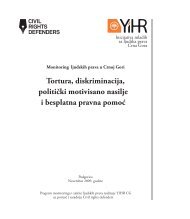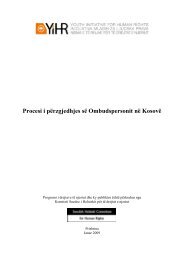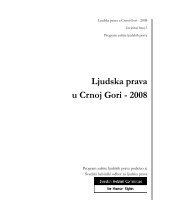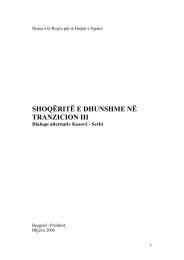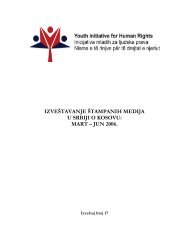Implementation of Transitional Laws in Serbia 2006
Implementation of Transitional Laws in Serbia 2006 - Archive
Implementation of Transitional Laws in Serbia 2006 - Archive
- No tags were found...
Create successful ePaper yourself
Turn your PDF publications into a flip-book with our unique Google optimized e-Paper software.
<strong>Implementation</strong> <strong>of</strong> <strong>Transitional</strong> <strong>Laws</strong> <strong>in</strong> <strong>Serbia</strong> <strong>2006</strong>the Council <strong>of</strong> Europe 100 . The solution accepted <strong>in</strong> the new Constitutionleads to the narrow<strong>in</strong>g <strong>of</strong> the right to objection <strong>of</strong> conscience, achieved <strong>in</strong>both the legislature and practice, which is strictly forbidden <strong>in</strong> the field <strong>of</strong>human rights.Right to InformationArticle 51Everyone shall have the right to be <strong>in</strong>formed accurately, fully and timely about issues <strong>of</strong> publicimportance. The media shall have the obligation to respect this right.Everyone shall have the right to access <strong>in</strong>formation kept by state bodies and organizationswith delegated public powers, <strong>in</strong> accordance with the law.The right to free access <strong>of</strong> <strong>in</strong>formation has been renamed <strong>in</strong> the newConstitution as the right to be <strong>in</strong>formed. The creators <strong>of</strong> the Constitutiondid not explicate why they have changed the name <strong>of</strong> this right. In additionto the name, the substance <strong>of</strong> the right has been changed as well. In theLaw <strong>of</strong> the Free Access to Information <strong>of</strong> Public Importance one can f<strong>in</strong>dthe follow<strong>in</strong>g def<strong>in</strong>ition:Everyone shall be entitled to be <strong>in</strong>formed as to whether a government agency possesses aspecific piece <strong>of</strong> <strong>in</strong>formation <strong>of</strong> public import, and/or whether it is otherwise accessibleto him.Everyone shall be entitled to have an <strong>in</strong>formation <strong>of</strong> public import accessible to him, byenabl<strong>in</strong>g him to have an <strong>in</strong>sight <strong>in</strong>to the document conta<strong>in</strong><strong>in</strong>g the piece <strong>of</strong> <strong>in</strong>formation <strong>of</strong>public import, the right to a copy <strong>of</strong> such document, as well as the right to be sent, at therequest, a copy <strong>of</strong> the document by mail, telex, electronic mail or <strong>in</strong> some other way. 101In addition to a broader def<strong>in</strong>ition <strong>of</strong> the obligations <strong>of</strong> the governmentalbodies, even those bodies are def<strong>in</strong>ed by the Law as much broader than <strong>in</strong>the Constitution. Thus, the Law states that the follow<strong>in</strong>g are consideredgovernmental bodies:1) a public agency, a territorial autonomy agency, a local self-government agency, as wellas organizations entrusted with carry<strong>in</strong>g out public powers (here<strong>in</strong>after: public agency);100 More on this <strong>in</strong> the book by the Lawyers’ Committee for Human Rights: Objection <strong>of</strong> Conscience, Belgrade,2000101 Law on free access to <strong>in</strong>formation, Article 5, see above under 328



